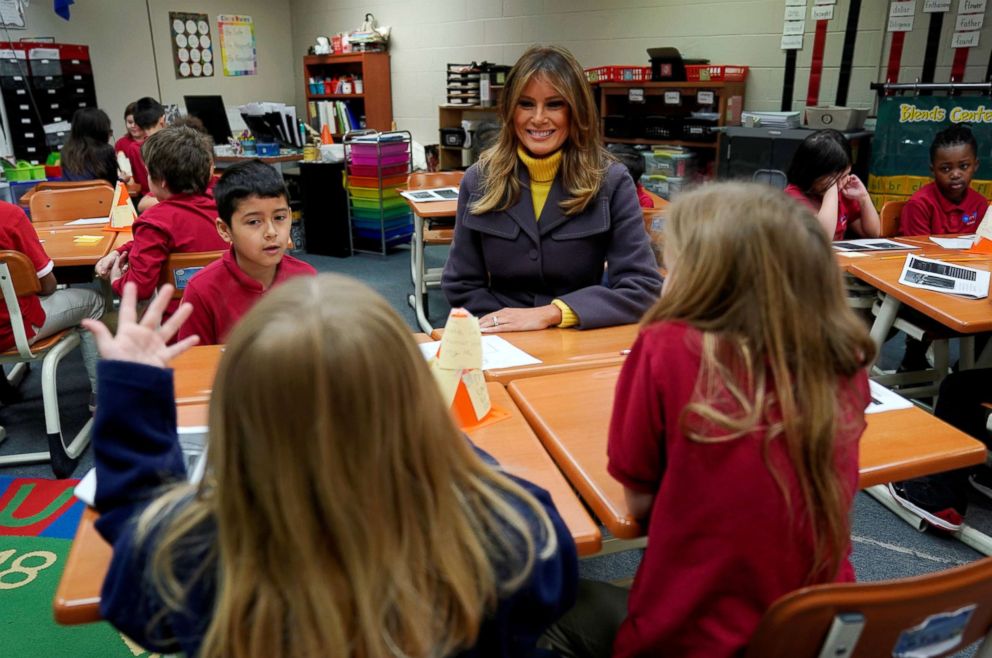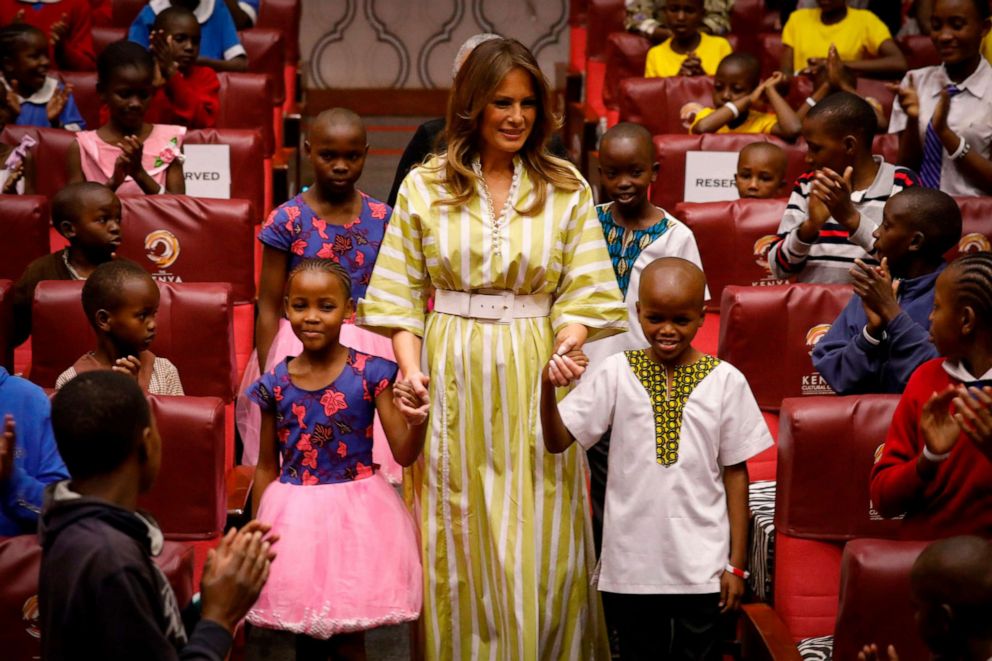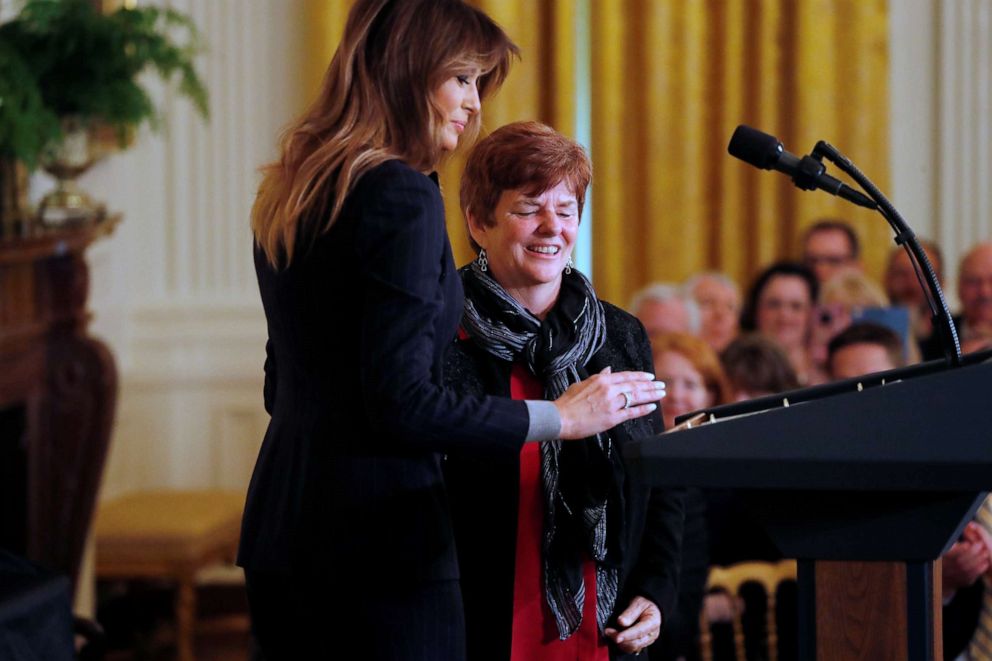A year later, Melania Trump's 'Be Best' initiative highlights differences with president
The first lady's initiative has contrasted, complimented her husband's policies.
It's been one year since first lady Melania Trump launched her "Be Best" initiative.
"As a mother and first lady it concerns me that today's fast-paced and ever-connected world can make children less prepared to manage their emotions, causing them to turn to forms of destructive actions, such as bullying, unhealthy habits, risky online behavior, drug abuse, and addiction, or even suicide," the first lady said at a Rose Garden event celebrating the anniversary of her initiative. "One year ago today, I launched Be Best, an awareness campaign dedicated to the children of this country and all over the world."
While the campaign has sought to address a wide array of issues affecting children -- well-being, cyberbullying, the opioid epidemic -- it's also served to highlight differences between her and the president.
"The first lady is clearly making her own statements. She is, in some ways, making them in defiance of the president, and that is an interesting thing for her to do," said ABC News political commentator Cokie Roberts.

One key way the first lady demonstrated her independence from President Donald Trump has been in her focus on combating cyberbullying and promoting internet safety, despite the fact that her husband is notorious for using Twitter to bash rivals.
"It's very odd for the first lady to take on bullying and social media and say the people should be respectful and try to reach for compromise in social media when her husband is so notorious for not doing that, but she seems to be saying, in some ways, 'Do what I say, not what he does,'" Roberts said.
The first lady has made no secret of the fact she doesn't always support her husband's behavior on Twitter but said that it won't deter her from her advocacy on the issue.
"I don't agree always what he posts. But his action is his action. And I tell him that. I will be hit with criticism to talking about cyberbullying. But it will not stop me to do what is right," she told ABC News in an interview in October.
Cyberbullying is just one of the ways the first lady has diverged from her husband.
When she took her Be Best initiative abroad during a multi-country tour of Africa, the first lady sought to highlight the positive work of USAID in supporting children's education and health issues on the continent.

The first lady's focus on the good works of foreign aid stood in stark contrast to her husband's call to slash USAID by 33% in his previous budget proposal -- a suggestion that Congress ultimately rejected.
But the first lady's most glaring act against one of her husband's policies came amid the height of controversy over the administration's zero-tolerance policy, which resulted in the forced separation of thousands of migrant children from their parents.
When she learned that her husband's administration was separating migrant families through news coverage, the first lady said that she "reacted right away."
"It was unacceptable, for me, to see children and parents separated. It was heartbreaking. And I reacted with my own voice. I went to the border and met with the Border Patrol," she told ABC News' Tom Llamas in October.
But while the first lady has been unafraid to publicly break with her husband on the national stage, she has also found cause for collaboration with the West Wing. In the case of the nation's opioid epidemic, she amplified the focus and advocacy of one of the administration's top domestic policy priorities.
She has put a particular focus on the dangers for pregnant mothers and babies and has traveled to hospitals and special care facilities specializing in care for infants recovering from the effects of their mothers' use of opioids while pregnant.
"The first lady has been the central force in increasing awareness and resources for this issue, and also with respect to those working so hard to help keep newborns and their mothers together, which is so important," said White House counselor Kellyanne Conway.
Prior to the official launch of her initiative, the first lady traveled to West Virginia to visit Lily's Place, a facility that provides specialized care for infants suffering with withdrawal -- a condition known as neonatal abstinence syndrome. And since her visit in 2017, Lily's Place Executive Director Rebecca Crowder said the White House has continued to lend support.
Crowder said the White House played an instrumental role in helping to secure Medicaid funding.
What had been a three-year-long struggle to attain eligibility for Medicaid funding was accelerated and completed within a couple of weeks, according to Crowder, once she reached out to the White House and got direct assistance from Conway.
"It has provided a stream of funding -- it was so essential," Crowder said, explaining that the facility's supplemental funding through the state was set to run out and would have left Lily's Place without the ability to provide care for patients on Medicaid.

In an interview with ABC News, Conway did not dispute Crowder's story but pointed to the passage of legislation last year, called the CRIB Act, in making Medicaid funding more available for the treatment of babies born with opioid addictions as being the turning point.
"The measurable progress that this administration has had is seen most specifically through organizations like Lily's Place where states have more flexibility to move Medicaid dollars and hopefully that will encourage others to develop their own version of Lily'sPlace," Conway said.
Conway credited the synergy between the president and first lady's staff on the issue of opioids, which she observed is "the one big initiative that's both East Wing and West Wing," as being critical to the progress made.
While the first lady has been credited for raising awareness around the opioid epidemic, the broad nature of her overall initiative has muddled her messages, said Kate Andersen Brower, author of "First Women: The Grace and Power of America's Modern First Ladies."
"It's too broad an initiative in the first place. It's much better when she focuses on the opioid abuse and then, of course, the obvious criticism of her husband's social media habits," Brower said. "If you look at other first lady's initiatives, like Mrs. Obama's Let's Move campaign, or Laura Bush's literacy program, theirs were so specific."
But Brower observes that much of the challenge for the first lady is no fault of her own, but -- in part -- due to the chaos in the West Wing.
"I don't think it's been the success they wanted, in part because of the chaos in the White House, it's hard to get traction," Brower said. "There's nothing they can do to get the eyes off the West Wing to focus on what they're doing, because there's too much controversy in the West Wing."




